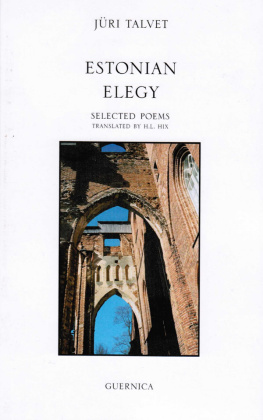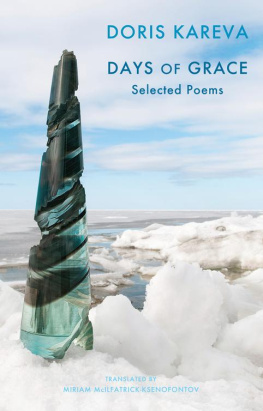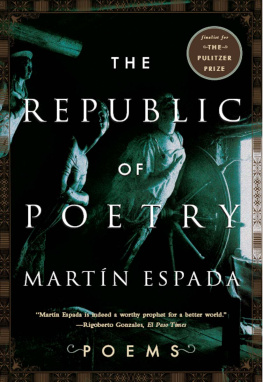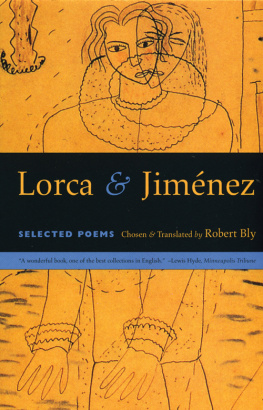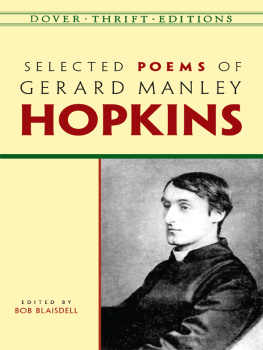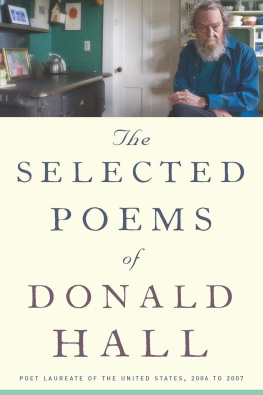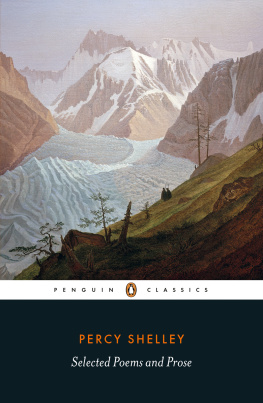Jüri Talvet - Estonian elegy: selected poems
Here you can read online Jüri Talvet - Estonian elegy: selected poems full text of the book (entire story) in english for free. Download pdf and epub, get meaning, cover and reviews about this ebook. year: 2008, publisher: Guernica Editions, genre: Romance novel. Description of the work, (preface) as well as reviews are available. Best literature library LitArk.com created for fans of good reading and offers a wide selection of genres:
Romance novel
Science fiction
Adventure
Detective
Science
History
Home and family
Prose
Art
Politics
Computer
Non-fiction
Religion
Business
Children
Humor
Choose a favorite category and find really read worthwhile books. Enjoy immersion in the world of imagination, feel the emotions of the characters or learn something new for yourself, make an fascinating discovery.
- Book:Estonian elegy: selected poems
- Author:
- Publisher:Guernica Editions
- Genre:
- Year:2008
- Rating:4 / 5
- Favourites:Add to favourites
- Your mark:
- 80
- 1
- 2
- 3
- 4
- 5
Estonian elegy: selected poems: summary, description and annotation
We offer to read an annotation, description, summary or preface (depends on what the author of the book "Estonian elegy: selected poems" wrote himself). If you haven't found the necessary information about the book — write in the comments, we will try to find it.
From one of Estonias finest poets and literary figures, this new collection showcases the poetry of Jri Talvet and represents the classic voice that has propelled him to the upper echelon of the medium. Providing insight into Talvets country of origin, these poems show a worldview unique to Estonias burgeoning economic and cultural place in Europe.
Estonian elegy: selected poems — read online for free the complete book (whole text) full work
Below is the text of the book, divided by pages. System saving the place of the last page read, allows you to conveniently read the book "Estonian elegy: selected poems" online for free, without having to search again every time where you left off. Put a bookmark, and you can go to the page where you finished reading at any time.
Font size:
Interval:
Bookmark:
SELECTED POEMS
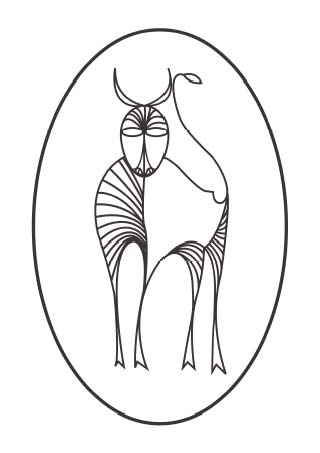
We thank Eesti Kultuurkapital (Traducta) for its kind support. We are thankful to R. W. Stedingh, poet, scholar and translator, whose suggestions helped polish the manuscript.
Because this project opened a door for me into a new language, I felt none of the loss of meaning that poems inevitably endure going from one language to another, only the gain of meaning I experienced by participating in them. Translation after all is a serious distortion of my part of the process, since I knew no Estonian when we started. Our procedure was simple. Mr. Talvet, who is fluent in Estonian, Russian, Spanish, and English, sent literal translations, in response to which (after looking up each of the words of the original in my Estonian dictionary) I produced a poetic translation, to which he suggested changes on the occasions when the license I had taken resulted in significant inaccuracies. After having produced in this way a complete draft of the manuscript, we spent a week together in Boston revising the draft into a more polished book.
My previous experiences learning languages began with the skeleton or the clothing: the skeleton in the case of Latin and Greek, where I was taught declensions and conjugations first, with the result that I can still say hic haec hoc all the way through but can no longer read Horace, and the clothing in the case of German and French, with the result that I can still greet the conductor at the Hauptbahnhof with Guten Morgen! or Guten Abend! according to the time of day but not ask directions to the youth hostel. But because it started with these poems, my Estonian, still fragmentary though it is and no doubt always will be, at least began at the heart: the first words I learned were armastus (love) and surm (death). That symbolizes for me what makes Jri Talvets work a paradigm of the possibilities of poetry: it starts at the heart of human experience, love and death, and culminates in a vision of a new Europe, indeed a new world, vivified by that experience. H. L. H.
University of Wyoming
The only certain conclusion of the investigating commission is that the huge ship was brought down by water. No, it cannot be true. Cramps of disbelief constricted throats that morning. Legs turned to lead, as if earth were dragging us to its roots, the way water tore them, naked children, suddenly from their dreams to her iron-cold breasts. No, it cannot be true. Liberty should have meant warmth at last, and joy.
As always, among the first, Estonia pushed forward proudly. The tether tied to us from twilit past times could be forgotten finally, and the dark Middle Ages with their foolish taboos could withdraw. Had there not been enough bowing already to German lords, scions of Vikings, Russian wags? Enough hauling of stumps and stones at the marshs edge? And now that the people had power in its hands, why could not the feast of the bodys solace last forever? (In this land the breath of prophets put pressure on both ears. Hegel, Marx, Lenin, Bakhtin... Who from the left hand, who from the right, depends on which side of the map you adopt. Poor little Jew Yuri Lotman, on the sad, fragile middle way, had no hope of becoming a prophet, his eyes no longer open to the sky, here at the cemetery in Tartu, Europes dump, last year on a biting autumn day, homeless, speechless, taken now for Russian, now for Latvian, his only eulogy the violins nightingale song by the nourishing river that indifferently, coolly flows past.) No, it cannot be true.
What stupid sophistry about God, sin, the duty of fasting! Where was Christ when the Knights of the Cross killed the children of Marys Land and raped women and girls, when, barely having roofed the first rooms of our own, we found ourselves back on the snowy Siberian plains gnawing on permafrost, at the waste lands rocky dump, there from where they say we came. No, it cannot be true. For thousands of years already we have been Europeans: early tillers, at a time when others, the stronger, consumed their neighbors, like an insatiable swarm of grasshoppers discovered and plundered new continents, driven by hunger, by the darksweet womb of a foreign woman. Then a precipice, bitterness, anyway the cool grin of death. Is small size proof of nobility? Have we not also desired a midday under our mournful skies? The king of Estonians rising from the field of mera, his sword, bright with the blood of the foreign exploiters pointed exultantly to the sun! The ships lights went out suddenly; in the waters womb, amid seaweed, shoals of silent fish, a school of children slept, dreaming of a clear, bright summer morning. No, it cannot be true.
We have waded in the mud of history, calling for help from the bastards of our lords. But who would recognize the puny name of Sittow in the endless halls of Europes castles, in the numberless flock of Low Country painters? Who would notice Schmidts sweat and soul in the lens, piercing into space, that illuminates regardless, or Martens, among the faithful Russian civil servants, in the rear of the regiment, without a necktie? Then, Peterson, the Estonian Keats taken too young to the grave, and the father of our song, Kreutzwald, who conducted the hero of Marys Land to Tartarus, as Vergil did Dante, to find love there. (By that time the German Faust already sat comfortably on the knees of the Virgin in heaven late, always late!) Or the singer of sunrise, Koidula, whose streaming ravenblack hair proved the descent of Estonians from the Peruvian arch-Inca, just like the brush of Viiralt, made of Berber womens hair. Who would learn to pronounce their names, or the even less sonorous, clumsily compound Tammsaare? Who would care about his earth-colored proofs in a language the same as the tongue of Basques, the nahuatl of Indians, the nonsense sounds of Celts. No, it cannot be true. Now Estonia sank again to a common grave, so suddenly there was no time to divine who in the mist of times had been master and who slave, who until the death hour had fornicated in the bed of pleasure and who had loved the homeland.
Font size:
Interval:
Bookmark:
Similar books «Estonian elegy: selected poems»
Look at similar books to Estonian elegy: selected poems. We have selected literature similar in name and meaning in the hope of providing readers with more options to find new, interesting, not yet read works.
Discussion, reviews of the book Estonian elegy: selected poems and just readers' own opinions. Leave your comments, write what you think about the work, its meaning or the main characters. Specify what exactly you liked and what you didn't like, and why you think so.

